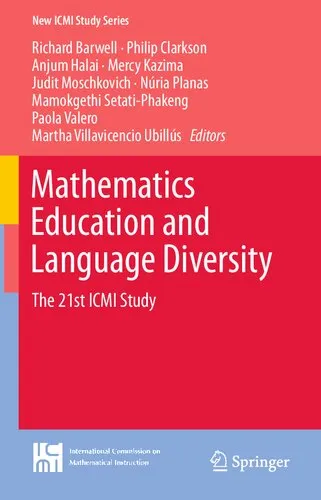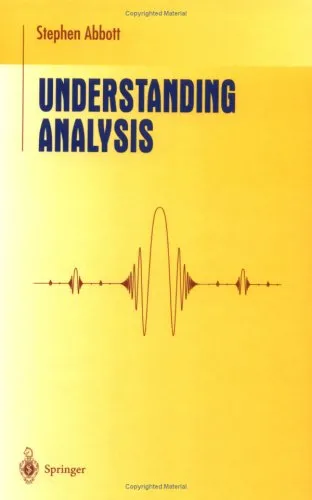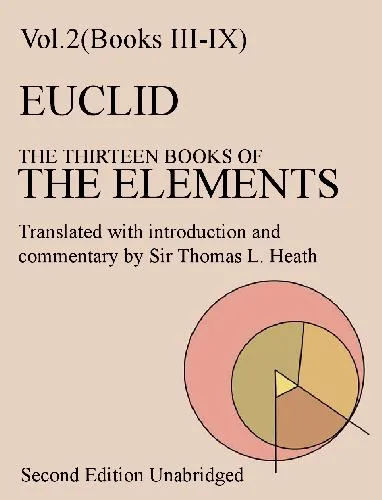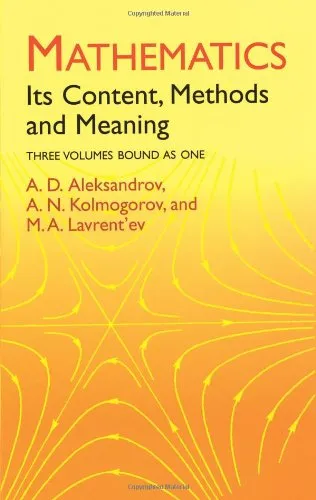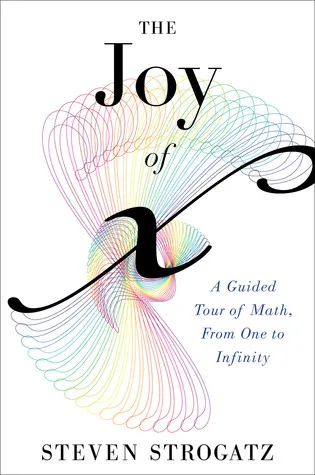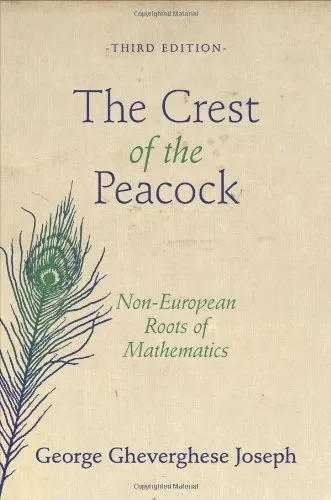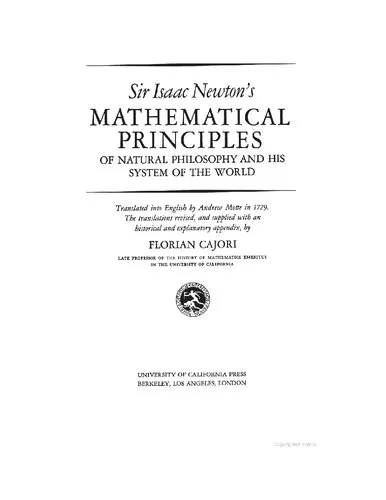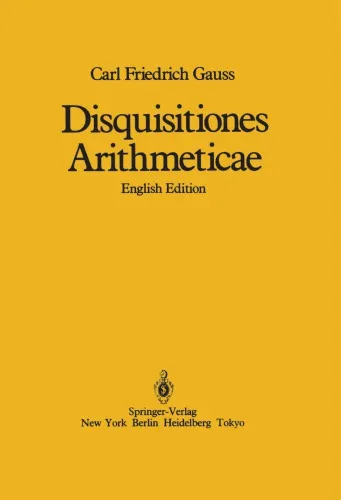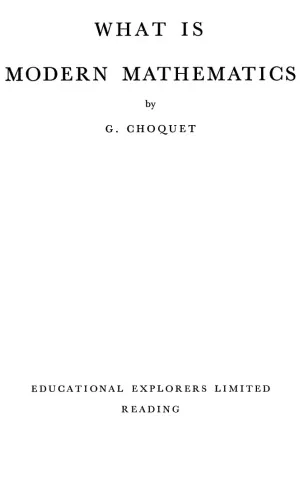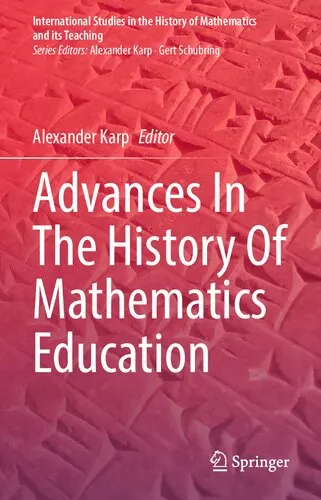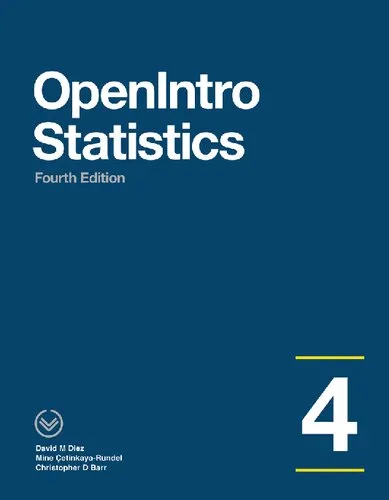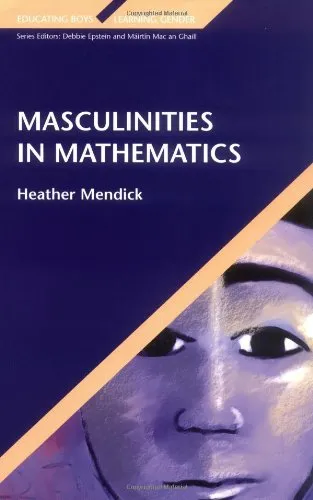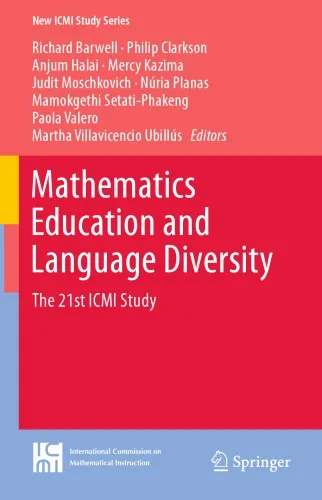Mathematics Education and Language Diversity: The 21st ICMI Study (New ICMI Study Series)
4.5
بر اساس نظر کاربران

شما میتونید سوالاتتون در باره کتاب رو از هوش مصنوعیش بعد از ورود بپرسید
هر دانلود یا پرسش از هوش مصنوعی 2 امتیاز لازم دارد، برای بدست آوردن امتیاز رایگان، به صفحه ی راهنمای امتیازات سر بزنید و یک سری کار ارزشمند انجام بدینکتاب های مرتبط:
مقدمهای جامع بر کتاب Mathematics Education and Language Diversity: The 21st ICMI Study
کتاب Mathematics Education and Language Diversity: The 21st ICMI Study بهعنوان یکی از آثار برجسته در زمینه آموزش ریاضیات، به بررسی تأثیرات چندزبانگی و تنوع زبانی بر آموزش ریاضی میپردازد. این کتاب که در مجموعه New ICMI Study Series منتشر شده است، توسط گروهی از ویراستارهای برجسته از جمله ریچارد بارول، فیلیپ کلارکسون، انجم هلای، مرسی کازیما، جودیت موسچکوویچ، نوریا پلاناس، ماموکت سیاتی-فاکنگ، پائولا والرو و مارتا ویلاویکنسیو اوبیوس تألیف و ویرایش شده است. در این کتاب، تلاش بر آن بوده تا پژوهشهای علمی، بینرشتهای و کاربردی حوزههای آموزش ریاضی و زبانشناسی ترکیب شوند تا چشماندازهای جدیدی را برای یادگیری موفق ریاضیات در جوامع چندزبانه ارائه دهند.
خلاصه کتاب
این کتاب به بررسی نقش زبان در آموزش ریاضی پرداخته و سؤالات مهمی همچون چگونه زبان بر یادگیری مفاهیم ریاضی تأثیر میگذارد و چگونه میتوان از این تنوع زبانی بهعنوان یک ابزار آموزشی استفاده کرد، مطرح میکند. کتاب از طریق بخشهای مختلف خود، مطالعات جدید بر روی چندزبانگی را تحلیل کرده و چالشها و فرصتهای مرتبط با آن را در کلاسهای درس بررسی میکند. رویکرد بینالمللی این اثر، تجربههای مربوط به مناطق مختلف جهان را گردآوری کرده و به جنبههای فرهنگی، اجتماعی و فردی مرتبط با زبان و ریاضیات میپردازد. هر فصل به موضوعات خاصی همچون ارتباط زبان و منطق، تعامل زبان و فرهنگ در یادگیری ریاضیات و نقش زبان مادر و زبان ثانویه در آموزش ریاضی اختصاص دارد.
نویسندگان کتاب در تلاش بودهاند با ارائه مدلهایی کاربردی، تحقیقاتی و تجربی، فرصتهای یادگیری را برای دانشآموزان در جوامع چندزبانه افزایش دهند. همچنین، پیشنهاداتی برای سیاستگذاریهای آموزشی و روشهای تدریس متناسب با شرایط اجتماعی و فرهنگی متنوع ارائه شده است.
نکات کلیدی
- تأثیر چندزبانگی بر رویکردهای تدریس و یادگیری ریاضیات
- بررسی نظریات مختلف درباره روابط زبان و تفکر ریاضی
- تحلیل چالشهای آموزشی معلمان در محیطهای چندزبانه
- تأکید بر استفاده از زبان بهعنوان ابزار کمککننده در کلاسهای ریاضیات
- الگوهای موفق تدریس ریاضی در جوامع چندزبانه
نقلقولهای مشهور از کتاب
“Language is not just a medium of instruction; it is a reflection of thought, culture, and mathematical reasoning.”
“Diversity in language is a challenge, yet it is an incredible opportunity to rethink mathematics education globally.”
چرا این کتاب حائز اهمیت است؟
کتاب Mathematics Education and Language Diversity یکی از منابع کلیدی برای هر کسی است که در حوزه آموزش ریاضی فعالیت دارد یا به مطالعه تأثیرات زبان بر یادگیری علاقهمند است. این کتاب نه تنها راهکارهایی اجرایی برای معلمان ارائه میدهد، بلکه زمینهساز توسعه سیاستهای آموزشی مؤثر در سطوح ملی و بینالمللی نیز هست. با افزایش جهانی شدن و ارتباط فرهنگی، درک اهمیت تنوع زبانی و نحوه استفاده از آن در محیطهای آموزشی یک نیاز اساسی است. این کتاب پلی است بین نظریه و عمل، و خواننده را به عمق تأثیرات زبان بر یادگیری مفهومهای پیچیده ریاضی میبرد.
در نهایت، این اثر علمی و پژوهشی نه تنها دانشپژوهان و سیاستگذاران را مخاطب قرار میدهد، بلکه الهامبخش معلمان در محیطهای واقعی آموزشی و دانشآموزانی است که در مسیر یادگیری ریاضیات در جوامع چندزبانه حرکت میکنند.
Introduction
Mathematics Education and Language Diversity: The 21st ICMI Study is a significant contribution to the field of mathematics education and a critical exploration of language diversity in the teaching and learning of mathematics. Edited by a passionate and accomplished team of scholars, including Richard Barwell, Philip Clarkson, Anjum Halai, Mercy Kazima, Judit Moschkovich, Núria Planas, Mamokgethi Setati-Phakeng, Paola Valero, and Martha Villavicencio Ubillús, the book highlights the intersections of multilingualism, multiculturalism, and mathematics education on a global scale.
This volume is part of the esteemed "New ICMI Study Series" and reflects the International Commission on Mathematical Instruction (ICMI)’s commitment to understanding the complex realities of mathematics education. With globalization and increasing migration shaping today’s classrooms, the role of language in mathematics education has never been more critical. This book unpacks the connections between mathematics and language in diverse sociocultural contexts, offering theoretical insights, practical approaches, and policy implications for educators, researchers, and policymakers.
Detailed Summary of the Book
The book comprises a series of carefully curated research studies, case studies, and theoretical frameworks aimed at illuminating the complex relationship between language diversity and mathematics education. It delves into topics such as bilingual and multilingual settings, the challenges of teaching mathematics in second or additional languages, and how language acts as both a resource and a barrier in diverse classrooms.
Contributors from across the globe present their findings on how teachers and learners navigate the dual demands of mastering mathematical concepts while managing language differences. The chapters are interdisciplinary, drawing on linguistics, education, and mathematics to examine how specific linguistic features impact learning experiences and mathematical understanding.
Notably, the discussion extends beyond mere teaching strategies; it addresses broader questions of language equity and social justice, exploring how systemic factors shape educational opportunities and outcomes for linguistically diverse students. From theoretical frameworks to classroom interventions, the book provides a comprehensive overview of the challenges and possibilities in this field.
Key Takeaways
- The role of language in learning mathematics is both powerful and complex, influencing not only comprehension but also identity and participation in learning communities.
- Multilingualism presents unique opportunities for mathematical understanding, as it allows learners to draw on multiple linguistic resources.
- Equity and inclusion are central concerns in mathematics education, requiring systemic changes to ensure that language diversity is viewed as an asset rather than a barrier.
- Innovative teaching strategies, such as translanguaging and code-switching, can foster deeper mathematical engagement and learning in diverse classrooms.
- Global perspectives, informed by case studies from different regions and educational systems, provide valuable insights into how language diversity can shape educational practices and policies.
Famous Quotes from the Book
"Language is not a neutral medium; in mathematics education, it carries not only the weight of concepts and procedures but also the social and cultural dimensions that give them meaning."
"Diversity in language is not a problem to be solved; it is a reality to be embraced in creating equitable and meaningful mathematical experiences."
"In the multilingual mathematics classroom, translanguaging offers a window through which students can access mathematical ideas in ways that are both personal and collective."
Why This Book Matters
Mathematics Education and Language Diversity: The 21st ICMI Study is pivotal in shaping how we think about education in contemporary times. In an increasingly interconnected world, educational systems must address the challenges and opportunities of linguistic diversity. This book provides a roadmap for navigating these complexities, ensuring that mathematics education remains inclusive and effective for all learners, regardless of their linguistic backgrounds.
By advancing theoretical and practical understandings, this volume equips educators, researchers, and policymakers with tools to create classrooms where linguistic diversity is celebrated rather than marginalized. It underscores the importance of revisiting long-held assumptions about language and mathematics, advocating for practices that prioritize equity and inclusivity. With its global perspectives, the book resonates beyond specific regional contexts to address universal issues in mathematics education.
دانلود رایگان مستقیم
شما میتونید سوالاتتون در باره کتاب رو از هوش مصنوعیش بعد از ورود بپرسید
دسترسی به کتابها از طریق پلتفرمهای قانونی و کتابخانههای عمومی نه تنها از حقوق نویسندگان و ناشران حمایت میکند، بلکه به پایداری فرهنگ کتابخوانی نیز کمک میرساند. پیش از دانلود، لحظهای به بررسی این گزینهها فکر کنید.
این کتاب رو در پلتفرم های دیگه ببینید
WorldCat به شما کمک میکنه تا کتاب ها رو در کتابخانه های سراسر دنیا پیدا کنید
امتیازها، نظرات تخصصی و صحبت ها درباره کتاب را در Goodreads ببینید
کتابهای کمیاب یا دست دوم را در AbeBooks پیدا کنید و بخرید
1385
بازدید4.5
امتیاز0
نظر98%
رضایتنظرات:
4.5
بر اساس 0 نظر کاربران
Questions & Answers
Ask questions about this book or help others by answering
No questions yet. Be the first to ask!
